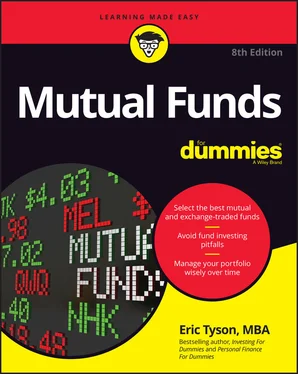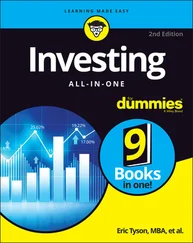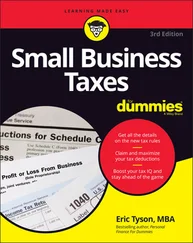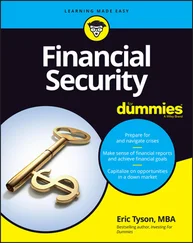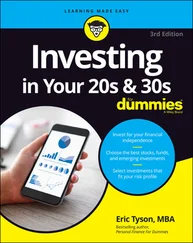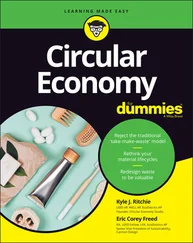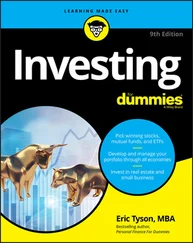Eric Tyson - Mutual Funds For Dummies
Здесь есть возможность читать онлайн «Eric Tyson - Mutual Funds For Dummies» — ознакомительный отрывок электронной книги совершенно бесплатно, а после прочтения отрывка купить полную версию. В некоторых случаях можно слушать аудио, скачать через торрент в формате fb2 и присутствует краткое содержание. Жанр: unrecognised, на английском языке. Описание произведения, (предисловие) а так же отзывы посетителей доступны на портале библиотеки ЛибКат.
- Название:Mutual Funds For Dummies
- Автор:
- Жанр:
- Год:неизвестен
- ISBN:нет данных
- Рейтинг книги:3 / 5. Голосов: 1
-
Избранное:Добавить в избранное
- Отзывы:
-
Ваша оценка:
- 60
- 1
- 2
- 3
- 4
- 5
Mutual Funds For Dummies: краткое содержание, описание и аннотация
Предлагаем к чтению аннотацию, описание, краткое содержание или предисловие (зависит от того, что написал сам автор книги «Mutual Funds For Dummies»). Если вы не нашли необходимую информацию о книге — напишите в комментариях, мы постараемся отыскать её.
Mutual Funds For Dummies
Mutual Funds For Dummies
Mutual Funds For Dummies — читать онлайн ознакомительный отрывок
Ниже представлен текст книги, разбитый по страницам. Система сохранения места последней прочитанной страницы, позволяет с удобством читать онлайн бесплатно книгу «Mutual Funds For Dummies», без необходимости каждый раз заново искать на чём Вы остановились. Поставьте закладку, и сможете в любой момент перейти на страницу, на которой закончили чтение.
Интервал:
Закладка:
Earning more income may help you save more to invest if you can get a higher-paying job or increase the number of hours you’re willing to work. Watch out, though: Many people’s spending has a nasty habit of soaking up increases in income. If you’re already working many hours, tightening the belt on your spending is likely better for your emotional and social well-being.
Maximize tax-deferred retirement account savings
Saving money is difficult for most people. Don’t make a tough job impossible by forsaking the terrific tax benefits that come from investing through retirement savings accounts. Employer-based 401(k) and 403(b) retirement plans offer substantial tax benefits. Contributions into these plans are generally federal- and state-tax-deductible. And after the money is invested inside these plans, the growth on your contributions is tax-sheltered as well. Furthermore, some employers will match a portion of your contributions.
PRIORITIZING YOUR FINANCIAL GOALS
Only you know what’s really most important to you and how to prioritize your goals. And prioritize you must — because your desires probably outstrip your ability to save and accomplish your goals. Now that doesn’t mean that you can’t fulfill your objectives and dreams. With an average income, you can, with proper planning, achieve most of the financial goals identified throughout this chapter. But you do have to be realistic about how many balls you can juggle at any one time.
That may mean, for example, that you have to reduce your retirement plan contributions while you save for a down payment on a home. Or that you have to downscale the size of your dream house a bit if you really want Junior to attend a pricey, private college.
Again, you’re the best person to decide what trade-offs to make. However, because of the tax breaks that come with retirement account contributions, retirement funding should always be near the top of your priority list. Remember: Making retirement account contributions reduces your tax bill, effectively giving you more dollars with which to accomplish your various goals.
And, as suggested by its name, your emergency reserve fund should always be a top priority, especially if your income is unstable and/or you have no family to fall back on. On the other hand, if you have a steady job and at least a few solvent family members, you can probably afford to build up this fund more slowly and in conjunction with other savings goals.
 Some investors make the common mistake of neglecting to take advantage of retirement accounts in their enthusiasm to invest in nonretirement accounts. Doing so can cost you hundreds of thousands of dollars over the years. Fund companies are happy to encourage this financially detrimental behavior, too. They lure you into their funds without educating you about using your employer’s retirement plan first because the more you invest through your employer’s plan, the less you have available to separately invest in their funds.
Some investors make the common mistake of neglecting to take advantage of retirement accounts in their enthusiasm to invest in nonretirement accounts. Doing so can cost you hundreds of thousands of dollars over the years. Fund companies are happy to encourage this financially detrimental behavior, too. They lure you into their funds without educating you about using your employer’s retirement plan first because the more you invest through your employer’s plan, the less you have available to separately invest in their funds.
Determine your tax bracket
When you’re investing in mutual funds outside of tax-sheltered retirement accounts, the profits and distributions that your funds produce are subject to taxation. So the type of fund that makes sense for you depends, at least partially, on your tax situation.
 If you’re in a high income tax bracket, give preference to mutual funds and exchange-traded funds, such as tax-free bond funds and stock funds with low levels of distributions (especially highly taxed short-term capital gains). In other words, focus more on stock funds that derive more of their expected returns from appreciation rather than from taxable distributions. If you’re in a low bracket, avoid tax-free bond funds because you end up with a lower return than in taxable bond funds. (In Part 4of this book, I explain how to select the best fund types to fit your tax status.)
If you’re in a high income tax bracket, give preference to mutual funds and exchange-traded funds, such as tax-free bond funds and stock funds with low levels of distributions (especially highly taxed short-term capital gains). In other words, focus more on stock funds that derive more of their expected returns from appreciation rather than from taxable distributions. If you’re in a low bracket, avoid tax-free bond funds because you end up with a lower return than in taxable bond funds. (In Part 4of this book, I explain how to select the best fund types to fit your tax status.)
Please see Chapter 10for complete information on the taxation of investment returns, including recent tax law changes.
Assess the risk you’re comfortable with
Think back over your investing career. You may not be a star money manager, but you’ve already made some investing decisions. For instance, leaving your excess money in a bank savings or checking account is a decision — it may indicate that you fear volatile investments.
 How would you deal with an investment that dropped 10 to 50 percent in a year, or even in just a few months? Some of the more aggressive mutual funds and exchange-traded funds that specialize in volatile securities like growth stocks, small company stocks, emerging market stocks, and long-term and low-quality bonds can quickly fall. While 50 percent declines usually take longer than one year to play out, that doesn’t make the lost value any less painful! The worst thing you can do when stocks suffer a major decline is to bail out and then miss out on the inevitable rebound so it’s crucial to buy stocks and hold them for the long run.
How would you deal with an investment that dropped 10 to 50 percent in a year, or even in just a few months? Some of the more aggressive mutual funds and exchange-traded funds that specialize in volatile securities like growth stocks, small company stocks, emerging market stocks, and long-term and low-quality bonds can quickly fall. While 50 percent declines usually take longer than one year to play out, that doesn’t make the lost value any less painful! The worst thing you can do when stocks suffer a major decline is to bail out and then miss out on the inevitable rebound so it’s crucial to buy stocks and hold them for the long run.
 You can invest in the riskier types of securities by selecting well-diversified mutual funds that mix a dash of aggressive securities with a healthy helping of more stable investments. For example, you can purchase an international fund that invests the bulk of its money in companies of varying sizes in established economies and that has a small portion invested in riskier, emerging economies. That would be safer than investing the same chunk in a fund that invests solely in small companies that are just in emerging countries.
You can invest in the riskier types of securities by selecting well-diversified mutual funds that mix a dash of aggressive securities with a healthy helping of more stable investments. For example, you can purchase an international fund that invests the bulk of its money in companies of varying sizes in established economies and that has a small portion invested in riskier, emerging economies. That would be safer than investing the same chunk in a fund that invests solely in small companies that are just in emerging countries.
Review current investment holdings
Many people have a tendency to compartmentalize their investments: IRA money here, 401(k) there, brokerage account somewhere else. Part of making sound investment decisions is to examine how the pieces fit together to make up the whole. That’s where jargon like asset allocation comes into play. Asset allocation simply means how your investments are divvied up among the major types of securities or funds, such as money market, bond, United States (U.S.) stock, international stock, and so on.
Another reason to review your current investments before you buy into new funds is that some housecleaning may be in order. You may discover holdings that don’t fit with your objectives or tax situation. Perhaps you’ll decide to clear out some of the individual securities that you know you can’t adequately follow and that clutter your life.
Consider other “investment” possibilities
Mutual funds and exchange-traded funds are a fine way to invest your money but hardly the only way. You can also invest in real estate, invest in your own business or someone else’s, or pay down mortgage debt more quickly. Again, what makes sense for you depends on your goals and personal preferences. If you dislike taking risks and detest volatile investments, paying down your mortgage may make better sense than investing in funds.
Reaching Your Goals with Funds
Mutual funds and exchange-traded funds can help you achieve various financial goals. The rest of this chapter gives an overview of some of these more common goals — saving for retirement, buying a home, paying for college and higher education costs, and so on — that you can tackle with the help of funds. For each goal, I discuss what kinds of funds are best suited to it and point you to the part of the book that discusses that kind of fund in greater detail.
Читать дальшеИнтервал:
Закладка:
Похожие книги на «Mutual Funds For Dummies»
Представляем Вашему вниманию похожие книги на «Mutual Funds For Dummies» списком для выбора. Мы отобрали схожую по названию и смыслу литературу в надежде предоставить читателям больше вариантов отыскать новые, интересные, ещё непрочитанные произведения.
Обсуждение, отзывы о книге «Mutual Funds For Dummies» и просто собственные мнения читателей. Оставьте ваши комментарии, напишите, что Вы думаете о произведении, его смысле или главных героях. Укажите что конкретно понравилось, а что нет, и почему Вы так считаете.
